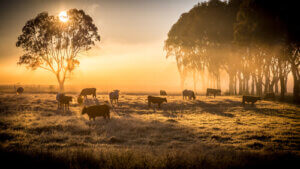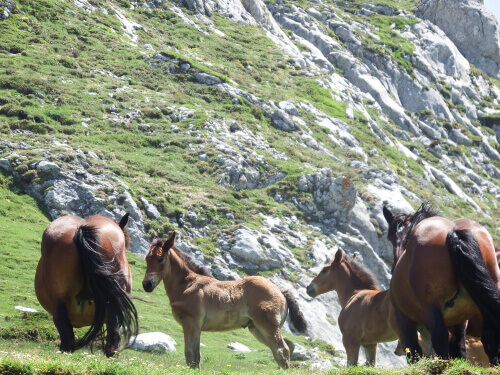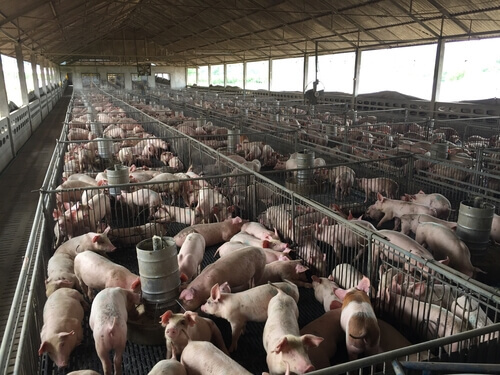What Is Extensive Livestock Farming?


Written and verified by the vet Eugenio Fernández Suárez
It’s impossible to understand the history of mankind without taking a look at extensive livestock farming. For thousands of years, we were hunters, until we began to settle in areas and domesticate animals.
Although intensive livestock farming has gained prominence in recent years, the history of mankind is characterized by extensive livestock farming, a different model of production.
What do we mean by extensive livestock farming?
This model of animal production seeks to make efficient use of a territory’s natural resources. But in this efficiency, it seeks consonance and making the most of the territory with the least possible impact, instead of only seeking production.
Extensive livestock farming mainly involves grazing by native breeds that have adapted to the territory in which this farming takes place. These breeds haven’t been selected to produce a lot of milk or meat. Rather, their selection is natural, similar to wild animals. So, in many cases, they can live outdoors without suffering from diseases.
Why is extensive livestock farming important?
This type of farming uses natural environments such as pastures to feed livestock. This use modifies nature by generating agro-ecosystems, which the livestock ends up forming part of.

Finally, the welfare of these animals is much better than those that live in stables or gigantic sheds. Although extensive farmers may use shelters or milking parlors, the truth is that their livestock doesn’t live in captivity, per se, and can travel for miles carrying out their natural behavior.
How does it differ from intensive livestock farming?
Extensive livestock farming is the opposite of intensive livestock farming. The latter seeks maximum profitability, which endangers ecosystems and the welfare of the animals that live and grow up in this production model.
The energy expenditure and pollution that intensive livestock farming produces are enormous. It takes large portions of land in order to house these animals and their feed. What’s more, industrial livestock feed requires enormous monocultures of soybeans and grains where hardly any animals can live, and this can cause deforestation.
Intensive livestock farming animals tend to suffer more behavioral problems and diseases associated with captivity. And, although there are some environmental enrichment programs to prevent this, we know that industrial livestock farming compromises animal welfare considerably.

So why don’t we just use extensive livestock farming?
The advantages of extensive farming seem clear, so why isn’t it more common? The truth is that it has lower productivity and doesn’t meet consumer demand. It would be impossible for the entire planet to consume large quantities of meat through extensive livestock farming alone.
In addition, the products of extensive livestock farming tend to be more expensive. This is because production isn’t centralized and large companies that ally themselves with transporters and large supermarkets don’t support it.
So, although it’s more respectful of animals and the environment than industrial livestock farming, it’s increasingly difficult to consume the products of extensive livestock farming.
This means that extensive livestock producers have had to adapt to the market and to cities. They have to sell cheap products to compensate for the fact that they produce very little.
And since it costs them more to produce, they earn considerably less than they should. They have to adapt to cheap intensive production that lowers prices at the expense of the animals.
Wolves and extensive livestock farming
In addition, this low purchasing power means that they’re sometimes unable to cope with the presence of predators. These predators don’t attack industrial livestock, since they live their entire lives in giant buildings close to cities. On the other hand, free-range animals don’t have this kind of protection and are prone to attack.
This is why it’s extensive farming that creates the problem between farmers and the Iberian wolf. It’s probably better to support extensive livestock farming than to hunt the wolf or demonize farmers. If these farmers sell their product, they’ll have money to deal with the wolves through preventive measures such as the mastiff’s guardian instinct.
Although it’s the farmers who exploit the land, they’re still producers at the service of the consumer. So, the consumer also bears responsibility for the welfare of wild and domestic animals and for the ecosystems with which livestock farming coexists. So, we can conclude that eating less meat and buying extensive farming products means protecting nature.
It’s impossible to understand the history of mankind without taking a look at extensive livestock farming. For thousands of years, we were hunters, until we began to settle in areas and domesticate animals.
Although intensive livestock farming has gained prominence in recent years, the history of mankind is characterized by extensive livestock farming, a different model of production.
What do we mean by extensive livestock farming?
This model of animal production seeks to make efficient use of a territory’s natural resources. But in this efficiency, it seeks consonance and making the most of the territory with the least possible impact, instead of only seeking production.
Extensive livestock farming mainly involves grazing by native breeds that have adapted to the territory in which this farming takes place. These breeds haven’t been selected to produce a lot of milk or meat. Rather, their selection is natural, similar to wild animals. So, in many cases, they can live outdoors without suffering from diseases.
Why is extensive livestock farming important?
This type of farming uses natural environments such as pastures to feed livestock. This use modifies nature by generating agro-ecosystems, which the livestock ends up forming part of.

Finally, the welfare of these animals is much better than those that live in stables or gigantic sheds. Although extensive farmers may use shelters or milking parlors, the truth is that their livestock doesn’t live in captivity, per se, and can travel for miles carrying out their natural behavior.
How does it differ from intensive livestock farming?
Extensive livestock farming is the opposite of intensive livestock farming. The latter seeks maximum profitability, which endangers ecosystems and the welfare of the animals that live and grow up in this production model.
The energy expenditure and pollution that intensive livestock farming produces are enormous. It takes large portions of land in order to house these animals and their feed. What’s more, industrial livestock feed requires enormous monocultures of soybeans and grains where hardly any animals can live, and this can cause deforestation.
Intensive livestock farming animals tend to suffer more behavioral problems and diseases associated with captivity. And, although there are some environmental enrichment programs to prevent this, we know that industrial livestock farming compromises animal welfare considerably.

So why don’t we just use extensive livestock farming?
The advantages of extensive farming seem clear, so why isn’t it more common? The truth is that it has lower productivity and doesn’t meet consumer demand. It would be impossible for the entire planet to consume large quantities of meat through extensive livestock farming alone.
In addition, the products of extensive livestock farming tend to be more expensive. This is because production isn’t centralized and large companies that ally themselves with transporters and large supermarkets don’t support it.
So, although it’s more respectful of animals and the environment than industrial livestock farming, it’s increasingly difficult to consume the products of extensive livestock farming.
This means that extensive livestock producers have had to adapt to the market and to cities. They have to sell cheap products to compensate for the fact that they produce very little.
And since it costs them more to produce, they earn considerably less than they should. They have to adapt to cheap intensive production that lowers prices at the expense of the animals.
Wolves and extensive livestock farming
In addition, this low purchasing power means that they’re sometimes unable to cope with the presence of predators. These predators don’t attack industrial livestock, since they live their entire lives in giant buildings close to cities. On the other hand, free-range animals don’t have this kind of protection and are prone to attack.
This is why it’s extensive farming that creates the problem between farmers and the Iberian wolf. It’s probably better to support extensive livestock farming than to hunt the wolf or demonize farmers. If these farmers sell their product, they’ll have money to deal with the wolves through preventive measures such as the mastiff’s guardian instinct.
Although it’s the farmers who exploit the land, they’re still producers at the service of the consumer. So, the consumer also bears responsibility for the welfare of wild and domestic animals and for the ecosystems with which livestock farming coexists. So, we can conclude that eating less meat and buying extensive farming products means protecting nature.
This text is provided for informational purposes only and does not replace consultation with a professional. If in doubt, consult your specialist.








